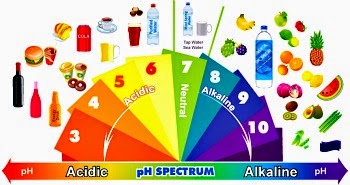Ph Balance
Ph; A MATTER OF LIFE…………………………..
To ensure homeostasis, the intracellular and extra cellular fluids must contain almost balanced quantities of acid and alkaline. The chemical reactions that take place in the body are very sensitive to the slightest fluctuation of the acidity and alkalinity of the body fluids. The method of discerning the acid and alkaline of the body is called Ph (potential hydrogen). Any departure from the narrow limits of normal Ph can greatly disrupt the bodily functions. The acid or alkaline content of the fluids of the body are measured on a scale called the Ph scale. This scale runs from 0 to 14. A solution with a Ph of 7 (such as water) is neutral. Anything above 7 is considered alkaline and below 7 acidic. The normal range for the human bodies fluids is just above 7, just a little on the alkaline side. When the Ph falls below 7.35 it is called acidosis, when the Ph goes above 7.35 it is called alkalosis. Either condition can seriously compromise homeostasis. The acid- alkaline balance is carefully regulated by the kidneys, lungs and a number of chemicals called buffers. These buffers are present in the body fluids. The blood is the most sensitive to the balance of acid and alkaline. Even a few points difference on the scale can cause coma, or death where the blood is concerned.Generally Ph imbalance is caused by what we consume. All ingested substances and all situations (physical, emotional, and mental) affect the body and leave an acid or alkaline residue in the saliva and urine. It is possible to test your Ph level with test strips purchased at a health food store. The bulk of the American diet consists of foods that are acidic in nature. This means that after we consume them they leave a residue that is acidic in the body. When the diet is imbalanced, the body fluids are constantly in the acidic range, causing a slow, but steady corrosion of the body and lead to numerous health problems. The management of Ph is so important that the body has developed strict accounting procedures to monitor acid/alkaline balances in every cell. Fundamentally, all regulatory mechanisms (including breathing, circulation, digestion etc) serve the purpose of balancing Ph, by removing caustic metabolized acid residues from the body tissue without damaging living cells. If the Ph deviates too far to the acid or alkaline side cells become poisoned by their own toxic waste and die. Some acidic substances need to be eliminated as fast as possible. They are too strong and poisonous to be passed thru the kidneys and large intestine without doing damage. In digestion those substances are neutralized by mineral compounds and can safely be eliminated.
Ph can be controlled with diet. A list of acid forming and alkaline forming foods is easily found on the internet. The important things to remember are to eat lots of vegetables (especially green leafy and colorful), fruit and some whole grains. If you chose to eat meat and dairy purchase only organic and take in moderation. A well balanced diet is important including nuts, seeds and legumes. Chewing your food well is very important. The saliva contains enzymes that neutralize acid. Normal Ph is easier to maintain without the consumption of sugar, refined and processed foods, drugs, alcohol, and chemical additives. Always using fresh, organic, local, ingredients when possible provides the best source of nutrients available.
Submitted by Tricia @ Nutrition by Tricia
